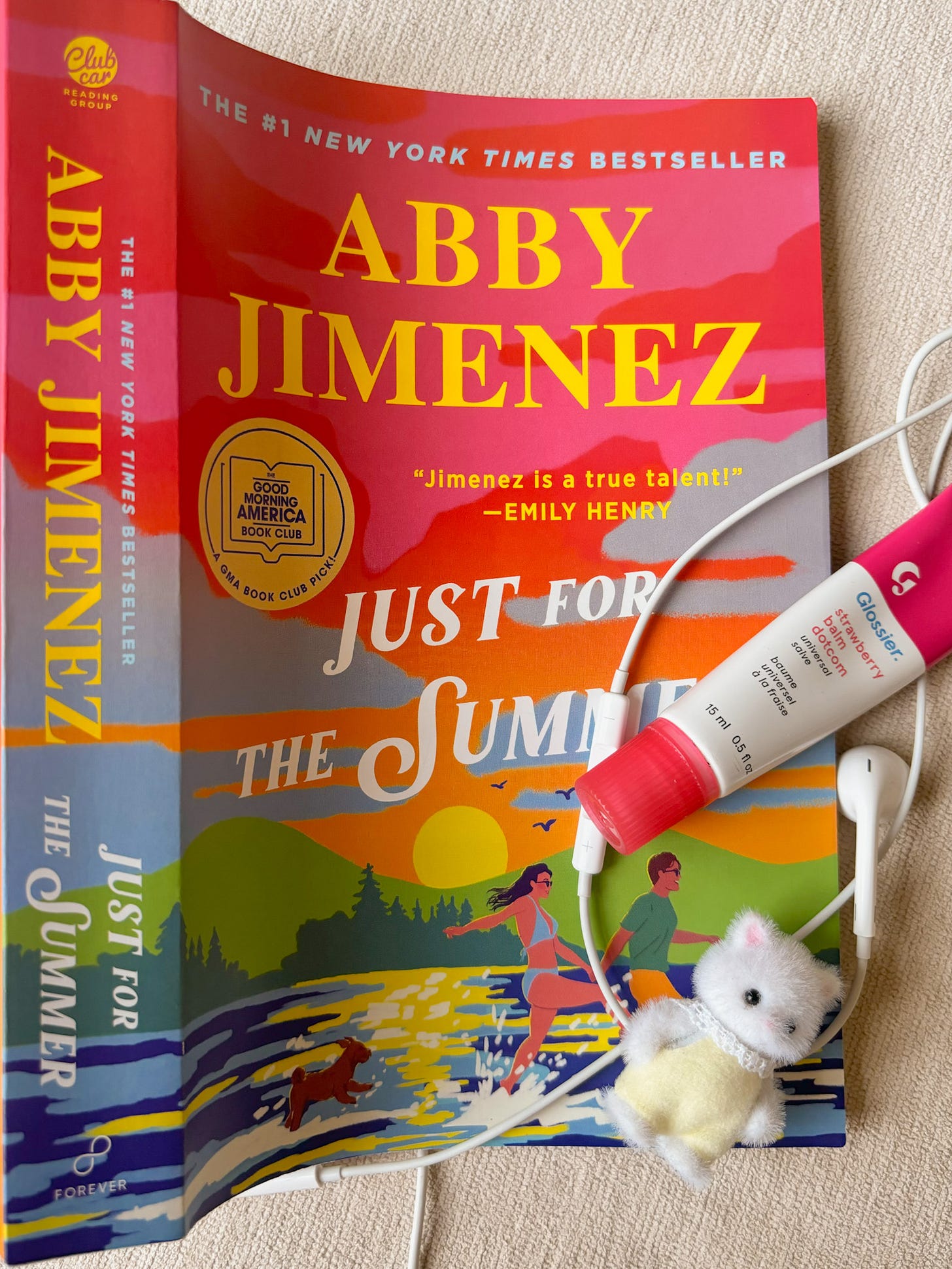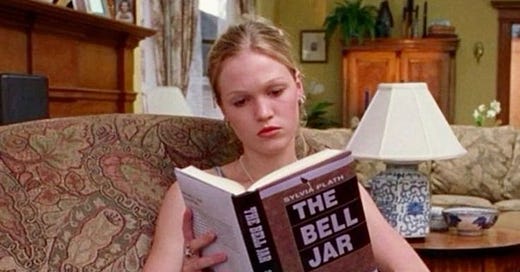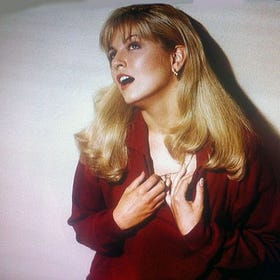carrying around a copy of the bell jar doesn't make you look smarter
or undoing pretentious reading habits, social media is a villain (as always), and doing what makes you happy
I’ve always seen myself as something of a book snob. I’d read the books that appealed to me and I couldn’t help myself if they all were semi-complex literary fiction novels, or books of essays about feminity, or texts about anti-capitalist theory. In my head, I was reading for pleasure, and that pleasure included the feeling of accomplishment and pride when I got to discuss complex topics and flex my literary muscles in a conversation. I would see the “booktok faves” or the “romance you can’t live without” tables at bookstores and immediately turn my back. Why would I sit down and read something that wasn’t contributing to the carefully curated selection of books I prided myself on reading?
I guess I’m still somewhat of a literary snob, maybe I always will be. I do truly love complicated literature and stories that make me sit and think and go back and re-read, and I do really love personal essays and theory, but without directly realizing it, I opened that triple-locked door in myself and allowed room for other books.
I think a lot of us fall into this without realizing it, we get caught up on how the books we read make us look, and how they’re perceived. Just take a quick look at the summer reading lists and articles about reading like a lit girl, and the hottest pool reads, it’s all about how you’re seen with a book, as opposed to the actual content that you’re consuming. When did books go from being books to being accessories? Was it when Kendall Jenner started posting in bikinis on chaise lounges holding one up? Was it Emrata taking selfies with her memoir? Was it booktokers assigning different aesthetics to their favorite books, showing ways to style an outfit around it?
Sometimes I think I’m too harsh, that I immediately scoff when I see this kind of performative reading, reading just for aesthetic purposes, but I know it’s because to me, that’s never been what reading is. I was not cool as a child. I would disappear into a book, and completely lose myself, because that was where I would rather be. Reading was never glamorous or an aesthetic to me, it was avoidance, it was a way to find myself and escape the harsh realities of growing up.
Social media is detrimental to being a reader. It constantly raises the question of why do I even read in the first place? It pushes books that glorify awful awful things (see: Colleen Hoover) while simultaneously listing out the books we must read to be perceived in a certain way. What happened to going to the library and grabbing a book off the shelf, reading the back cover, and borrowing it for the sake of reading for personal enjoyment? Everything’s about sales, image, followers, aesthetic—words that had no meaning to me when I was a child discovering my love for reading. Booktok plays into a hivemind mentality, when one person finds something wrong with a book, suddenly everyone begins to hate it for the same reason. Where is the critical thinking? The forming an opinion even if it is the minority view? Everything is about tropes and how-many-stars-did-you-give-this-on-goodreads and is-there-smut and would-sofia-coppola-like-this-book, instead of just simply reading.
As always, the aesthetic of the lit girl or the other aesthetics that internet culture decided belongs with certain books, are more important to the majority of society than having comprehensive discussions about a book or reading it just because you want to. And combined with the opposite end of the spectrum, people like me who consider themselves book snobs, those opposed to the aestheticization of literature and full of “did you know I’ve read Tolstoy?” drops at dinner parties, a semi-toxic mentality was formed, one I admit that I adopted, something along the lines of how books could either be smart, or they could be fun, with almost no in-between.
You know those contemporary romance novels with a cursive-eqsue font on the cover and the main characters depicted as cartoonish illustrations? I would avoid those books like the plague. They felt off-putting to me, like I could pick them up and immediately know what happened and for so long, that meant that they were bad. I just never was interested in those, or the YA novels that so many people my age were discovering for the first time. ACOTAR? I read the first book in middle school. It just felt very juvenile for me, like I had matured and was not going to read something I would have enjoyed when I was 13 when I could grab an Elena Ferrante novel instead.
I was dumb enough to forget is that there’s room for both. I don’t have to (and shouldn’t) turn my back on something to be contrarian or because I’ve decided that I’m too old, too smart, too educated to read something. I experience a lot of literary fatigue, I think this started while I was at university, I would go from reading 19th-century British literature (for fun) to all of the books and articles for my major and I would feel tremendously burnt out. I didn’t want to stop reading, but I knew that if I continued along the road I was going down, I would exhaust myself completely.
I bought Emily Henry’s People We Meet on Vacation. I read it in one sitting. After I read it I had some kind of epiphany. Henry was writing characters that felt like real people, they weren’t the one-dimensional cartoons I had come to associate contemporary romance novels with, the plot was easy to follow, but still interesting, and it made me happy to read, which was the most important part. Emily Henry opened a door for me; I revisited books I enjoyed when I was younger, I read books that didn’t make me engage in insane discourses, I allowed myself to rediscover what reading for pleasure actually meant. It’s relaxing, it’s peaceful, I can shut my brain off and enjoy myself.

A few years later, I’d like to think I have a balance. I read the books I like, anything that I find interesting. Yes, I am still primarily drawn to literary fiction, to the Sally Rooneys and Elena Ferrantes and Lily Kings, but I’ll find myself grabbing a fantasy book that I would’ve loved at 14 or a summer romance that I can curl up in my hammock and devour. I still have a little bit of pretentiousness in me though, as much as I try to get rid of it. I’ve never read a Colleen Hoover book and frankly, I never want to (that’s a whole other story) and I still feel like I’m relatively picky about the romancey books I read (what can I say, I love a well-developed character) but what matters to me is that I’m trying. I don’t want to be pretentious anymore, it’s exhausting, it’s boring, and there’s no reason for it. I don’t care about my literary image or looking like a godforsaken lit girl or what is popular on booktok, I want to be happy and keep reading, and I learn more about what I enjoy with every day that passes.
If I could be so bold as to provide a piece of advice from a reformed pretentious literary snob, I would say to stop caring, which is easier said than done. Start small. Take the Joan Didion out of your tote bag before you go to a coffee shop. Stop thinking about your book as an accessory. Don’t read a book just to make a spotify playlist or a tiktok, read because you love it. And whether you love to read cookbooks or star wars novels or summer beach reads or feminist theory embrace it. Just read the books that make you happy when you read them, not because of how you look when you read them or log them on GoodReads.
for more people’s princess, you can find me on instagram @peoplessprincesss.
check out my latest:
i'm everywhere i'm so laura
This essay contains spoilers for Twin Peaks, Pretty Little Liars, Ethel Cain’s perfect album Preacher’s Daughter, and The Haunting of Hill House. Proceed at your own risk.
p.s. no weekly favorites because i posted another piece this week and they’re in there
okay, that’s all for now, love you all to pieces & i’ll see you soon!
sarah 💌








i'm wanting to sing the title like "they didn't teach you that in prep school so it's up to me, but no amount of vintage dresses gives you dignity"
a lot of the youth books I read as a kid like percy jackson, john green, anne of green gables, louis sachar, even harry potter-- really balanced voiceyness, humor, character development, plot. these books, i felt, had style without excessively pandering to young people. meanwhile i really did NOT enjoy the prose/pov in the hunger games or eragon. ultimately it was the GOOD youth books that primed me to become yk...a reader of ferrante and tolstoy and most recently a charming manga inspired novella called A Magical Girl Retires.
i think we overestimate the extent to which kids will just read "schlock." some young people are just discriminating readers!
lately i'm really vibing with this CS lewis quote
“Critics who treat 'adult' as a term of approval, instead of as a merely descriptive term, cannot be adult themselves. To be concerned about being grown up, to admire the grown up because it is grown up, to blush at the suspicion of being childish; these things are the marks of childhood and adolescence. And in childhood and adolescence they are, in moderation, healthy symptoms. Young things ought to want to grow. But to carry on into middle life or even into early manhood this concern about being adult is a mark of really arrested development. When I was ten, I read fairy tales in secret and would have been ashamed if I had been found doing so. Now that I am fifty I read them openly. When I became a man I put away childish things, including the fear of childishness and the desire to be very grown up.”
“I read books that didn’t make me engage in insane discourses, I allowed myself to rediscover what reading for pleasure actually meant. It’s relaxing, it’s peaceful, I can shut my brain off and enjoy myself.”
i love this. reading for pleasure and self nurturing has been medicine to me these last couple of years because i do it to feel good. everything by marian keyes has this effect for me bc it is both deep and uplifting (and makes me feel seen). 🎀